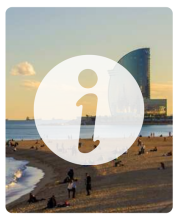
Even though Barcelona is a cosmopolitan city and nowadays, it’s getting easier to find someone that speaks English, it is well appreciated and better for you if you know how to say a few things in Spanish or Catalan that can save yourself in more than one situation.
And, yes, I know what the golden question is: what should we learn, Catalan or Spanish? I believe that most of you who decided to come to Barcelona for your Erasmus have already learned a bit of Spanish, but then you came to Barcelona and found out that most of the people here speak in Catalan. That is why I will explain how to say different words and phrases in both languages, and it's entirely up to you to choose which one to learn (if you decide on both, you will be the coolest one for sure ;) ).
To make myself clear, I will first write the words in Spanish and then in Catalan.
Oh, and remember that in Spanish and Catalan, accents are put on words to point out where the stronger syllable is, don’t panic!!
So who hasn’t heard yet of “Joder”, “Gracias”, “¿Qué?” or “Vale”? No one, right? That is what I thought. For those who just landed today, here are the words:
Joder (Fuck or Damn)
Gracias / Gràcies (Thanks)
¿Qué? / Què? (What?)
Vale / Vale (Okey/Alright)
Apart from these words, there is a list of basic things that you can learn pretty fast and that are going to be very useful:
Hola / Hola (Hello); Adiós / Adéu (Bye)
Sí (Yes); No (No)
Hasta pronto / Fins aviat (See you soon)
Buenos días / Bon dia (Good morning); Buenas tardes / Bona tarda (Good afternoon/evening); Buenas noches / Bona nit (Good night)
Muchas gracias / Moltes gràcies (Thank you very much); De nada / De res (You are welcome
Perdón / Perdó (Sorry); Disculpa (Excuse me)
No lo sé / No ho sé – I don’t know.
No hablo español/catalán / No parlo espanyol/català (I don’t speak Spanish/Catalan).
After this brief introduction we will show you some resources you may need in case you find yourself in a certain situation.
1. To say, “Where is …?”: ¿Dónde está …? / On està …?
- Example: ¿Dónde está la Sagrada Familia? / On està la Sagrada Família? – Where is the Sagrada Família?
¿Dondé está la parada de metro Plaza Cataluña? / On està la parada de metro Plaça Catalunya? – Where is the Plaça Catalunya metro stop?
2. Normally, if you ask for directions it will be very handy for you if you know these words:
Recto / Recte – Straight; Derecha / Dreta – Right; Izquierda / Esquerra – Left; Arriba / A dalt – Up; Abajo / A baix – Down; Cerca / A prop – Close; Lejos / Lluny – Far.
3. To say, “What does … mean?” : ¿Qué significa …? / Què vol dir … ? (… = the word you want to know the meaning of)
- Example: ¿Qué significa toque de queda? / Què significa toc de queda? – What does “toc de queda” mean?
I know it may seem like a lot of new information, but I assure you that, after a few days in this beautiful and amazing city, you will surprise yourself using them.
I want to also mention one last thing that may help you understand a bit more our languages. In Spanish and Catalan, we have two verbs that refer to the verb “to be”. We have “ser” and “estar”.
- Ser: this verb is used to refer to something that is always the same. For example: I am from Barcelona - (Yo) soy de Barcelona / (Jo) sóc de Barcelona.
- Estar: this verb is for temporary situations. For example: I am sick – (Yo) estoy enfermo/a / (Jo) estic malalt/a.
And that’s all folks! I hope it is very useful and handy. I am sure all of you will end up speaking a beautiful Spanish and Catalan. Remember that if you have any problems with the language or any situation you can always get in touch with any ESN coordinator.
Good luck! ¡Buena suerte! Bona sort!
--------------------------------------------------------------------------
Apart from these basic questions, I would also like to show you the numbers, as you never know when they will be useful. Better tres cervezas than una, right? ;)
1. Uno / Un; 2. Dos / Dos; 3. Tres / tres; 4. Cuatro / Quatre; 5. Cinco / Cinc; 6. Seis / Sis; 7. Siete / Set; 8. Ocho / Vuit; 9. Nueve / Nou and 10. Diez / Deu.
To conclude this brief introduction to Spanish and Catalan, let me write some sentences that you may also need:
No lo sé / No ho sé – I don’t know.
No lo/te entiendo / No ho/t’entenc – I don’t understand.
No hablo español/catalán / No parlo espanyol/català – I don’t speak Spanish/Catalan.
Estoy perdio/a / Estic perdut/da – I am lost.
Necesito ayuda / Necessito ajuda – I need help.
Hace calor / Fa calor – It is hot.
Hace frío / Fa fred – It is cold.
Tengo hambre / Tinc gana – I am hungry.
¿Puedes hablar más alto o lento? / Pots parlar més alt o lent? – Can you speak louder or slower?
No te oigo / No et sento – I can’t hear you.
I know it may seem like a lot of new information, but I assure you that, after a few days in this beautiful and amazing city, you will surprise yourself using them.
I want to also mention one last thing that may help you understand a bit more our languages. In Spanish and Catalan, we have two verbs that refer to the verb “to be”. We have “ser” and “estar”.
- Ser: this verb is used to refer to something that is always the same. For example: I am from Barcelona - (Yo) soy de Barcelona / (Jo) sóc de Barcelona.
- Estar: this verb is for temporary situations. For example: I am sick – (Yo) estoy enfermo/a / (Jo) estic malalt/a.
And that’s all folks! I hope it is very useful and handy. I am sure all of you will end up speaking a beautiful Spanish and Catalan. Remember that if you have any problems with the language or any situation you can always get in touch with any ESN coordinator.
Good luck! ¡Buena suerte! Bona sort!
